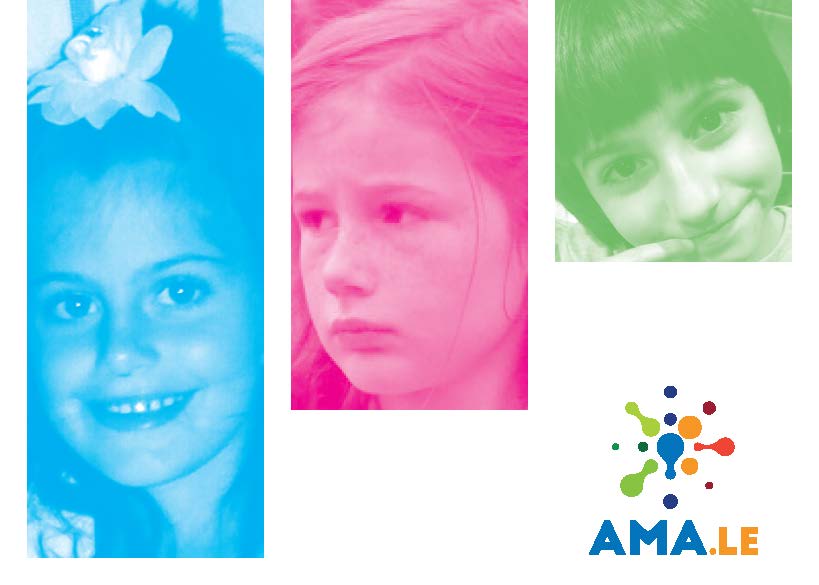
The AMA.le IQSEC2 association was born from the union of three mothers with girls suffering from this very rare disease and the name created using the initials of the names of these three beautiful girls: Annalisa, Matilde and Alessandra. It all began thanks to a group on facebook, in which there are cases from all over the world. Since there has not yet been an association, it was for us the only reference, the only way to confront and support each other.
Through this group we have begun to have daily contacts among ourselves and to inform ourselves through the reference hospitals, geneticists, convention centres, neuropsychiatrists, therapists who follow our girls, thus collecting as much information as possible. Hence the idea … to do something concrete for our girls and for all full-blown cases and not.
What is IQSEC2
IQSEC2 is a gene that encodes a protein that is very important for brain function, therefore when there is a mutation of this gene in a certain area, information arrives to the brain incorrectly.
HOW IT HAPPENS?
Most of the time the disease is called “DE NOVO” which means that the IQSEC2 mutation is not present in the parents.
WHO HITS?
This mutation affects the X chromosome of both sexes. Often those born with this mutation are not diagnosed, or diagnosed as mentally disabled. In females there are two X chromosomes in males XY therefore it is clear that male subjects are often more impaired at the motor level than female subjects.
In most cases, children are born apparently healthy, the onset of epilepsy and some alarm bells suggest that something is not going as it should. The child does not acquire age-related skills, the gaze is often absent, difficulty in grasping objects or using them in a functional way, absence of the indicative gesture, chewing difficulties, motor retardation, often absent language.
HOW COMMON IS THIS PATHOLOGY?
To date, about a hundred cases have been described in literature all over the world.
WHAT DOES THIS PATHOLOGY INVOLVE?
- SERIOUS INTELLECTIVE DISABILITY
- EPILEPSY
- AUTISTIC TRAITS
- MICROCEPHALIA
- MOTOR DELAY
- SERIOUS RELATIONAL DIFFICULTIES
- DIFFICULTY SWALLOWING AND CHEWING
- SLEEP DISORDERS
IS THERE A CURE?
Currently there are no specific treatments for disabilities associated with IQSEC2. What can help at the moment in addition to drugs to contain epilepsy and behavioral disorders are rehabilitation treatments aimed at improving cognitive and motor skills but also relational.
WHAT TREATMENTS CAN HELP IMPROVE THE LIFE OF CHILDREN WITH IQSEC2?
- PSYCHOMOTRICITY
- PASSIVE PHYSIOTHERAPY
- SPEECH THERAPY
- AAC
- HYDROKINESITHERAPY
- HYPOTHERAPY AND PET THERAPY
- BEHAVIORAL THERAPY
- MUSIC THERAPY
THE SERIOUS LIMITS OF THIS GENETIC MUTATION OBSERVED IN ALESSANDRA ANNALISA AND MATILDE
- FINE MOTORITY:
Motor control over small movements of the hands and fingers is very compromised.
Very often even just holding a marker can be difficult. - EYE-MANUAL COORDINATION:
Often making visual perception and hand action work together is very complicated. Even just loading food off the plate can be very complicated. - ABSENCE OF SPHINTERIC CONTROL:
They are not in control of their sphincters and do not communicate needs. - ABSENCE OF THE SENSE OF DANGER
- BEHAVIORAL PROBLEMS
- INTESTINAL PROBLEMS
- EPILEPSY
- SERIOUS INTELLECTIVE DISABILITY
- AUTISTIC TRAITS
- LACK OF APPITITE
- CHEWING AND SWALLOWING DIFFICULTY
- ALMOST TOTAL ABSENCE OF LANGUAGE
For all these reasons, those affected by this pathology need help and support in all daily activities.
OUR MISSION
WHAT ARE OUR GOALS?
First of all, to disclose as much information as possible, so that this very rare genetic mutation that involves severe disability is known throughout Italy and the world.
Consequently, promote by raising as many funds as possible to help research in order to study the IQSEC2 gene and find a cure for our girls but above all for all children and for those who will be born… a hope for the future.
The importance and attention to families with children and adults who find themselves living with the difficulties that this pathology entails.

